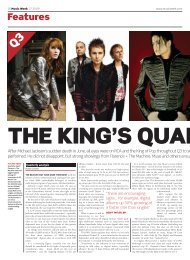Remake, Remodel: The Evolution Of The Record Label
Remake, Remodel: The Evolution Of The Record Label
Remake, Remodel: The Evolution Of The Record Label
Create successful ePaper yourself
Turn your PDF publications into a flip-book with our unique Google optimized e-Paper software.
This pre-draft version is strictly for review purposes only and is not for general dissemination or sharing.<br />
Gary Warren, Commercial Director at HMV, cited the example of Tom Petty’s recent<br />
album (Mojo) in the US where, included in the price of tickets was instant delivery of two<br />
new tracks, day and date delivery of new album and live tracks available at the end of<br />
the tour. Here it is clear that an artist like Petty finds it easier to sell tickets than to sell<br />
new music, but through bundling he leverages his live appeal into his new release.<br />
Likewise, the linking of physical sales and digital sales is something which is exercising<br />
labels and retail alike. It is acknowledged that, although physical is the declining format<br />
as digital grows, retail is able to promote sales in the physical world in ways that haven’t<br />
yet been mastered in digital.<br />
Both Tesco and HMV spoke of customer choice where the consumer can get great value<br />
whichever way they come at a purchase – e.g. a packaged good is sold containing access<br />
to digital files as well as a disc, and perhaps even access to a subscription service that is<br />
built in. Likewise, the consumer could buy the album digitally, but be sent the extra<br />
value physical items automatically. Salter believes that real fans will continue to want<br />
something over and above the digital file.<br />
Serving the fan<br />
Perhaps Tesco and Radiohead have been comparing notes! <strong>The</strong> new Radiohead album<br />
(King <strong>Of</strong> Limbs) was sold direct to consumers by the band and offered an option to buy a<br />
high ticket physical format. Part of the proposition includes an instant delivery of a<br />
digital version of the album.<br />
Radiohead have been arguably the most successful artist to circumvent the label system<br />
in recent years.<br />
After 15 years with EMI’s Parlophone label, the band utilised the element of surprise in<br />
Autumn 2007 when they announced a new album (In Rainbows) and invited fans who<br />
signed up to their site the opportunity to acquire the album digitally – at whatever price<br />
the fan chose to pay. <strong>The</strong> band also offered for pre-order a deluxe version of the album<br />
for delivery a few weeks later.<br />
This combination of honesty box self-pricing (arguably inspired by an example in the<br />
book Freakonomics 14 by Stephen Dubner and Steven Levitt) and high ticket deluxe<br />
version played with the notion of ‘value’ and simultaneously addressed the issues of<br />
online file-sharing, real terms price decline in retail CDs, the relationship between artist<br />
and fan and the desire for quality.<br />
Brian Message was part of the team that masterminded this release. He said, ‘[<strong>Record</strong><br />
labels are] should be in the artist/fan relationship business but mostly still cling to the<br />
copyright trading game with its reliance on the controlled distribution model. <strong>The</strong> digital<br />
world has exploded this approach and how we monetise what artists do is completely<br />
different and ever evolving.’<br />
14 Freakonomics: A Rogue Economist Explores the Hidden Side of Everything – SD Levitt & SJ Dubner, publ. Penguin; 1st<br />
edition (18 Jun 2007).<br />
20



